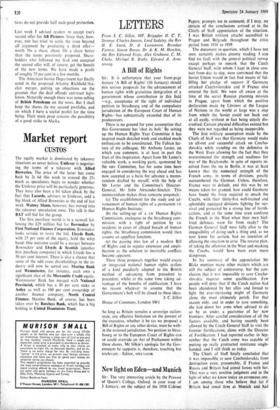A Bill of Rights
LETTERS
From S. C. Silkin, MP, Brigadier H. C. T. Stronge, Charles Janson, Lord Sudeley, the Rev H. E. Steed, D. A. Loosemore, Brendan Farrow, Simon Raven, Dr A. K. M. Hutchin. the Rev Edmund Ilogu, Alex Grahame, C. M. Cheke, Michael R. Braby, Edward A. Arm- strong.
Sir: It is unfortunate that your front-page feature 'A Bill of Rights' (10 January) should mix serious proposals for the advancement of human rights with gratuitous denigration of a government whose contribution in this field —e.g., acceptance of the right of individual petition to Strasbourg and of the compulsory jurisdiction of the European Court of Human Rights—has substantially exceeded that of its predecessors.
There is no ground for your assumption that this Government has 'shot its bolt.' By setting up the Human Rights Year Committee it has inspired much detailed work and enabled much enthusiasm to be coordinated. The Fabian- lec- ture of my colleague, Mr Anthony Lester, on which you comment, is at least in part the fruit of this inspiration. Apart from Mr Lester's valuable work, a working party, sponsored by the HRY Committee, has for some time been engaged in considering the way ahead and has now accepted as a basis for advance a memo- randum drafted by myself, with the help of Mr Lester and the Committee's Director- General, Mr John Alexander-Sinclair. This memorandum makes three concrete proposals: (a) The establishment for the study and ad- vancement of human rights of a permanent UK Human Rights Institute;
(b) the setting-up of a mc Human Rights Commission, analogous to the Strasbourg com- mission, with a right of petition by UK residents in cases of alleged breach of human rights; the Strasbourg commission would then assume an appellate function; (c) the passing into law of a modern Bill of Rights and its regular extension and ampli- fication as the solution to inevitable conflicts became apparent.
These three proposals together would create an integrated national human rights system of a kind peculiarly adapted to the British method of advancing from precedent to precedent. whilst at the same time taking ad- vantage of the benefits of codification. I have no reason whatever to assume that the Government's bolt will be closed to these ideas. S. C. Silkin House of Commons, London SW1
So long as Britain remains a sovereign nation- state, any effective limitation on the powers of the executive, whether it be (as we propose) a Bill of Rights or any other device, must be with- in the national jurisdiction. No petition to Stras- bourg or to the European Court of Rights can or could override an Act of Parliament within these shores. Mr Silkin's apologia for the Gov- ernment he supports is, therefore, touching but irrelevant.—Editor, SPECTATOR.


































 Previous page
Previous page